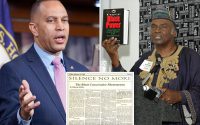Liz Truss blames economic ‘orthodoxy,’ Conservative party for downfall
Former British prime minister Liz Truss blamed on Sunday the economic “orthodoxy” in the country’s finance ministry, other nations and in parts of the governing Conservative Party for derailing her premiership and “plan for growth”.
Truss’s tenure was cut short last year after her largely unfunded mini budget and tax cuts pushed up borrowing costs and mortgage rates, sent the pound tumbling and shattered Britain’s reputation for financial stability.
Writing in the Sunday Telegraph newspaper in her first major foray into politics since the abrupt end to her premiership after just over six turbulent weeks in power, Truss wrote she believed her recipe for Britain by cutting taxes and removing some regulation was the right one.
But she was not successful, she wrote, because she had underestimated “the blob of vested interests” and orthodoxy.
“I am not claiming to be blameless in what happened, but fundamentally I was not given a realistic chance to enact my policies by a very powerful economic establishment, coupled with a lack of political support,” she wrote.
“I assumed upon entering Downing Street that my mandate would be respected and accepted. How wrong I was. While I anticipated resistance to my programme from the system, I underestimated the extent of it.”

She blamed the reaction not only on what she described as the left-leaning orthodoxy of the economic establishment but also on liability-driven investments (LDI), which pension funds use to cover their obligations. LDI’s were at the centre of the market turmoil following her mini-budget.
Truss also said she had underestimated “the resistance inside the Conservative parliamentary party to move to a lower-tax, less-regulated economy” and a drive on the global stage to “limit competition” between major economies.
“As I had spelled out during the leadership campaign, I wanted to go for growth … But this was not in line with the instinctive views of the Treasury (finance ministry) or the wider orthodox economic ecosystem.”
Grant Shapps, business minister, said everyone wanted lower taxes but Prime Minister Rishi Sunak’s government had to focus on reducing debt, bringing down inflation and boosting growth first.
Britain’s opposition Labour Party said it was time for a change of government.
“The Conservatives crashed the economy, sank the pound, put pensions in peril and made working people pay the price through higher mortgages for years to come,” said Rachel Reeves, Labour’s financial policy chief.
“After 13 years of low growth, squeezed wages and higher taxes under the Tories, only Labour offers the leadership and ideas to fix our economy and to get it growing.”


